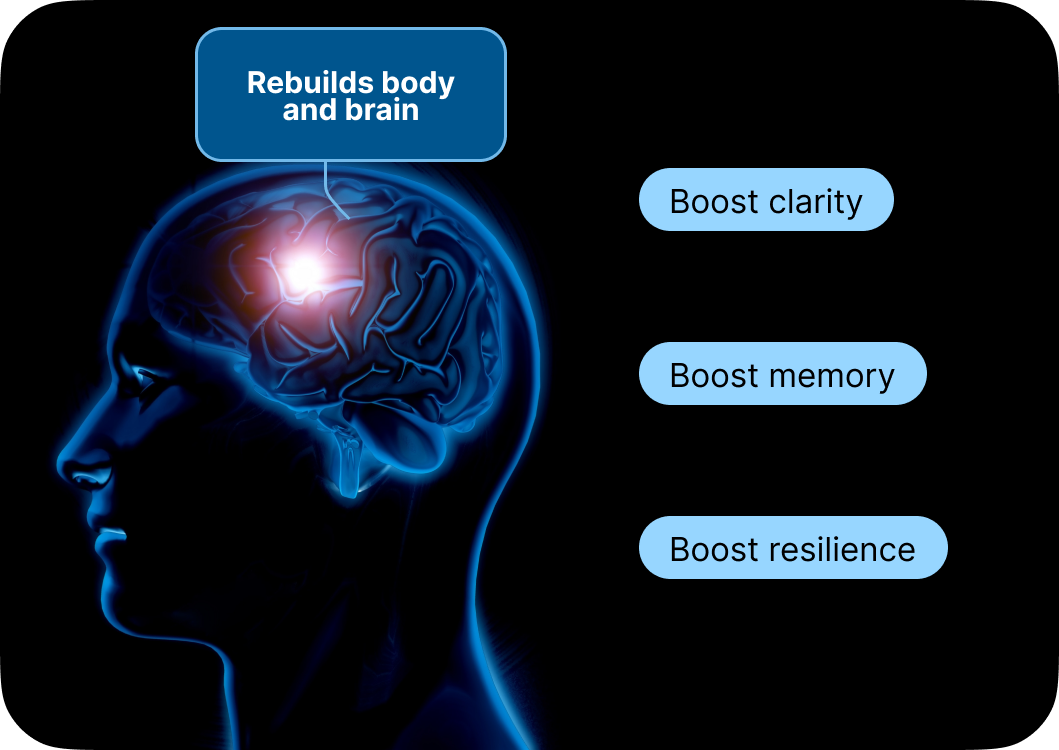For many of us reducing or quitting alcohol, the mental fog and cognitive struggles can feel overwhelming. You might notice difficulty concentrating, memory lapses, or that frustrating inability to think as clearly as you once did. This is where resistance training, lifting weights, using resistance bands, or even bodyweight exercises, enters the picture as an unexpected brain booster. While most people associate strength training with physical benefits, research reveals its powerful ability to increase BDNF [1], a protein essential for brain repair and cognitive function. Let's explore how building muscle can simultaneously rebuild your mental clarity.
The Science Behind Resistance Training and BDNF
Resistance training triggers multiple pathways that enhance BDNF production and cognitive function, making it particularly valuable for those in alcohol recovery. Here's how resistance training can help:
- Boosting BDNF through muscle contractions. When muscles contract against resistance, they release proteins called myokines that communicate with the brain. Research shows that resistance training can increase BDNF levels by 20-30% immediately after exercise, with regular training leading to sustained elevations [2]. This BDNF boost helps repair neurons damaged by alcohol and promotes the growth of new brain connections.
- Enhancing memory and learning. Studies demonstrate that resistance training improves both working memory and long-term memory formation [3]. One study found that older adults who performed resistance training twice weekly for six months showed significant improvements in cognitive function compared to those doing only stretching exercises [4]. For those recovering from alcohol-related memory issues, this benefit is particularly valuable.
- Reducing neuroinflammation. Chronic alcohol use triggers inflammation in the brain that can persist even after stopping drinking. Resistance training reduces inflammatory markers like IL-6 and TNF-alpha while increasing anti-inflammatory compounds [5]. This reduction in brain inflammation creates an environment where BDNF can work more effectively to support neural repair.
- Improving executive function. Resistance training specifically enhances executive function — the set of mental skills including focus, planning, and impulse control. Research shows that even moderate resistance training improves performance on cognitive tests measuring these skills [6]. Since executive function is crucial for maintaining sobriety and resisting cravings, this benefit directly supports recovery goals.
- Supporting mood through neuroplasticity. BDNF plays a key role in mood regulation, and low levels are associated with depression and anxiety, common challenges during alcohol reduction. Regular resistance training helps maintain higher BDNF levels, which supports the brain's ability to adapt and form new, healthier neural pathways. This neuroplasticity is essential for breaking old patterns and building new habits.

Tips for Incorporating Resistance Training Into Your Routine
Resistance training is adaptable to all fitness levels and circumstances. Here's how to get started:
- Start with bodyweight exercises. Begin with simple movements like push-ups, squats, and planks. These exercises require no equipment and can be done anywhere. Start with 2-3 sets of 8-12 repetitions, focusing on proper form rather than speed. Even these basic exercises stimulate BDNF production.
- Progress gradually with equipment. As you build strength, incorporate resistance bands, dumbbells, or gym equipment. Aim for 2-3 resistance training sessions per week, allowing at least one rest day between sessions for muscle recovery. Research shows this frequency optimizes BDNF response without overtraining [7].
- Focus on compound movements. Exercises that work multiple muscle groups simultaneously, like deadlifts, rows, and overhead presses, create a stronger BDNF response than isolation exercises. These functional movements also improve overall coordination and balance, which alcohol may have affected.
- Track your cognitive improvements. Keep a simple log noting not just your physical progress but also mental clarity, mood, and memory. Many people report feeling mentally sharper within 2-3 weeks of consistent resistance training. This awareness reinforces the brain benefits beyond just physical changes.
Making It Sustainable
Creating a lasting resistance training habit requires realistic planning:
- Time-efficient workouts. You don't need hour-long gym sessions. Research shows that even 20-30 minute resistance workouts can significantly boost BDNF [8]. Focus on quality over quantity, maintaining good form and appropriate intensity rather than lengthy sessions.
- Home workout options. Invest in basic equipment like resistance bands or adjustable dumbbells for home use. Having convenient options removes barriers on days when getting to a gym feels challenging. Many effective BDNF-boosting workouts can be completed in your living room.
- Listen to your body. During early recovery, energy levels may fluctuate. Start conservatively and increase intensity gradually. Some muscle soreness is normal, but sharp pain or extreme fatigue means you should scale back. Consistency matters more than intensity for long-term BDNF benefits.
If you have any health conditions or haven't exercised in a while, consult your healthcare provider before starting a resistance training program.
Summing Up
The cognitive and BDNF-boosting effects of resistance training make it an invaluable tool for anyone reducing alcohol consumption. By stimulating brain cell growth, improving memory and focus, and supporting mood regulation, resistance training helps reverse alcohol-related cognitive decline while building resilience for lasting change. The accessibility of bodyweight exercises and the relatively quick mental benefits make this practice sustainable even during challenging recovery periods. This makes resistance training a cornerstone habit for rebuilding both physical strength and mental clarity throughout your alcohol reduction/quitting journey.












